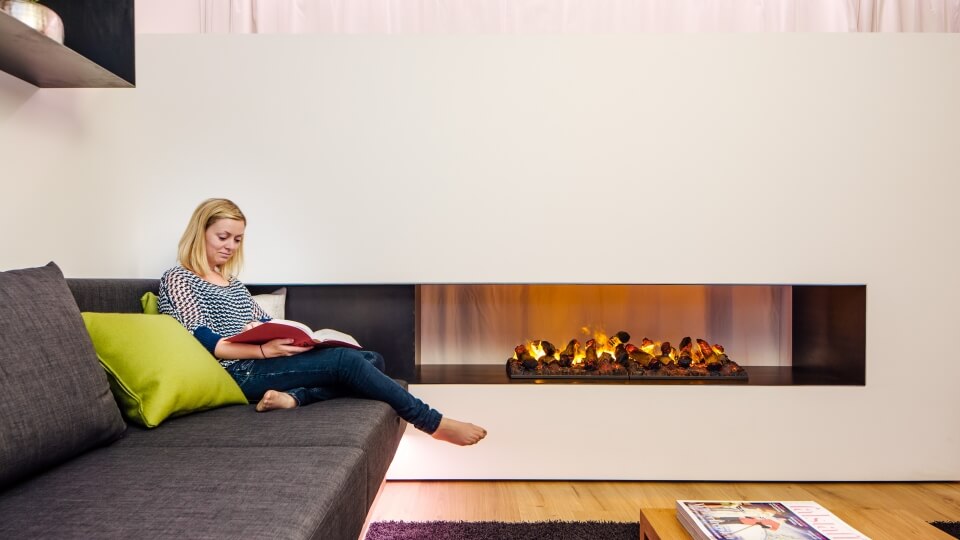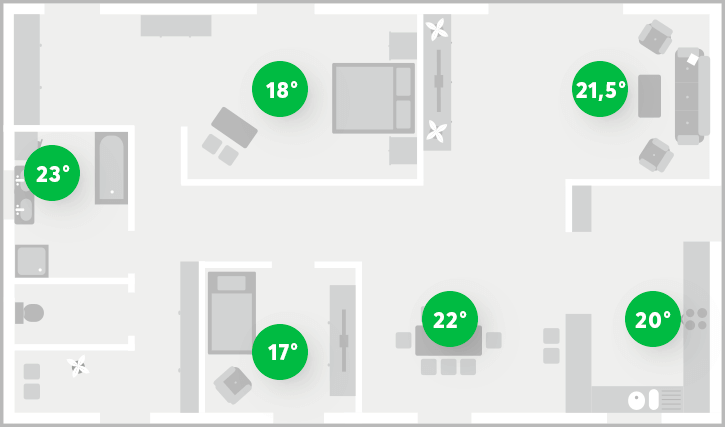
Smart Heating: 9 Frequently Asked Questions
The term ‘smart heating’ is becoming fairly common, but what does it actually mean? Here we cover some of the questions people usually have about smart heating systems as well as laying out the main benefits of implementing one into your home.
What is smart heating?
First up, we need to understand what smart heating means. Now, if you’ve been Googling it, you’ll most likely have come across a smart thermostat or two. Smart thermostats offer the ability to control heating via an app. The heating can be switched on and off remotely and the temperature adjusted up and down. Whilst these are not the most advanced options on the market, they do offer more control over your heating compared to the traditional boiler and thermostat set up. However, smart heating can be much more intelligent than a thermostat with a display screen, which we’ll look at below.

What’s the difference between ‘smart heating’ and ‘zoned heating’?
Zoned heating (also commonly called multi zone heating) is a type of smart heating that can offer greater control and efficiency.
Multi zone heating allows individual rooms or zones to be heated to a specific temperature, at a particular time of day, automatically. This is typically achieved through the use of smart thermostatic radiator valves, and it means you don’t waste energy or money heating rooms that no-one’s using.
Multi zone heating control can be tailored to your schedule to ensure your heating is optimised for the way in which you use your home. For example, if you usually take the dogs for a long, muddy walk on Sunday afternoons, the underfloor heating in the utility room will warm the room ready for when you return to ensure your coat and boots dry quickly.

What are the advantages of ‘smart’ heating over just a boiler with a timer?
Boiler timers work on the principle that the heating comes on when you’re getting up, switches off whilst you’re out at work and then fires up again prior to your return. All well and good except you’re stuck at the office helping on a project and won’t get home for another hour and a half. Or you’ve decided to go to the gym (well done you, gold star), or to the pub (better give that gold star back). All the while, the house is merrily heating away unnecessarily and costing you a pretty penny.
Smart heating gives you more options for managing your heating schedule, from being able to adjust the heating from afar via an app, to having intelligent occupancy-based heating. The latter may sound complicated but can be achieved with something as simple as a motion sensor. For example, if you’ve been Netflix bingeing in the lounge until late, the motion sensor will pick you up, and the heating will continue to run until you’ve left the room and gone to bed.
Is it just radiators that can be controlled?
Many UK homes are heated using radiators alone, so often we’ll talk about zoning the heating in your home using smart radiator valves, like our Valve Actuator Air.
However, it’s not just the humble radiator that can benefit from Loxone. Nipping at its heels is underfloor heating. Underfloor heating is a popular option for new homes in Austria (hey, it gets to -20C over there during winter, so you can hardly blame them for wanting a toasty floor), so we’ve ensured that the Miniserver is well versed in managing this type of heating.
Loxone can also control infrared panels, convection heaters, electrical heaters and HVAC systems. Don’t forget you can also use it to optimise solar water heating if you’ve got the appropriate infrastructure in your home.

Will smart heating save me money on my energy bills?
Smart heating control is becoming an increasingly important consideration for homeowners looking to cut down on their energy bills. Just like the traditional thermostat, a smart thermostat on its own can only control the temperature for a single zone or room, which means the temperature is the same for every room in the house. Whilst this type of heating control can bring savings of around £150 annually according to Ofgem, for maximum energy (and money) savings, a zoned heating system is the best option. Ofgem (2014) estimates that a multi zoned heating system could save up to £400 on the annual dual fuel bill of £1385.
Do I always have to use an app to adjust my heating?
Many ‘smart heating’ products, such as smart thermostats, set the expectation for consumers that heating needs to be manually controlled via an app. A much more convenient and efficient option; however, is a dynamic, learning heating system that knows when you are using rooms within your home and adjusts temperatures automatically. This type of smart heating system lowers the heating automatically when you are not at home and raises the temperature ready for your return home, all without the need for an app.
Smart heating apps offer a convenient and flexible way to interact with your heating system. For instance, the ability to adjust the heating from afar can be very appealing to those with unpredictable schedules, or when returning from holiday. Remote heating control can also be handy for those with holiday homes which they rent out to holidaymakers – they can ensure the house is warm and cosy whilst in use, and double check that the heating is not running during periods of vacancy.
Whilst apps do offer many advantages, we believe that they should not be at the centre of your heating control. We think a smart home should just get on with things and run to a schedule with minimal interaction. After all, who wants to constantly get their phone out to adjust the heating, switch the lights on and so on?
For that reason, we have developed our app to be complementary to the system, but not essential. The app itself is there for making adjustments to your heating, such as activating a heating boost, setting schedules or setting a ‘holiday mode’ if you’re going away but not needed for everyday control.

How easy is it to install a smart heating control system?
There are lots of options on the market for smart heating control from the basic smart thermostats to professionally installed multi zoned heating systems that control your radiators, underfloor heating system and hot water (in addition to controlling other elements of the home such as lighting, security and music).
Whichever you opt for, we would always recommend having a professional install your smart heating control system – even the ‘wireless’ systems will require some wiring to connect the boiler, which should only be carried out by a qualified electrician or electrically competent person.
What components are needed?
Smart heating control is not as complicated (or expensive) as you may think.
You’ll need something to control your boiler, plus radiator valves on your radiators or underfloor heating manifold, and, of course, some way of tracking ambient temperatures via a temperature sensor. Again, we advise that you work with a Loxone Partner on the installation side of things to ensure everything runs as it should.
Should I go for a wired or wireless setup?
Choosing a wired or wireless setup usually comes down to three things: the type of home you have, your budget, and your personal preference.
A wired system is usually the best option for those building a new home, adding an extension or rewiring an existing property.
Alternatively, wireless systems can offer greater convenience over wired systems – usually, they can be installed in just a few hours, and don’t require walls to be opened up to run new cables.
The downside of wireless can be limited functionality. Whilst there are some solutions, such as Loxone Air, that enable wireless multi zoned heating, these are not usually available as a DIY option.
For a solution like a wireless smart thermostat, you’ll need to buy multiple thermostats if you want to control different areas of your home.
I’m considering investing in a smart heating control system, what kinds of features should I be looking out for?
There are a few key questions to consider if you’re looking at investing in a smart heating control system. This might include:
- Can you control temperatures individually in the rooms or zones of your home?
- Are there options to create a heating ‘boost’ or override?
- Is it a self-learning or ‘smart start’ system? Can it learn how long it takes to reach your desired temperature and start heating in time for the house to be at the right temperature for the time you have specified?
- Are there options for ‘Holiday’ or ‘Away’ modes, so that you can lower the heating whilst you’re away from home?
- Does your system include motion-based heating – so if you remain in a room longer than expected, the room stays warm?
- Future expansion – could this solution control other aspects of your home, if you’d like it to?
- Is the system intelligent? So, if a window or door is left open, will it recognise not to crank up the heating to try and reach the desired temperature so as not to waste energy?
Discuss your project

Free & friendly advice
Chat to one of our experts and they can share ideas with you of what is possible – specific to your renovation extension or new build.

Tailored referral
From the large network of Loxone installers around the UK, we’ll help you find the perfect one for your project.



No Pressure
We’re simply here to help you, there are zero obligations to go ahead with anything. As long as we’ve been able to give you good advice, we’re happy.
Let’s chat about your project

Free & friendly advice
Chat to one of our experts and they can share ideas with you of what is possible – specific to your renovation extension or new build.



Tailored referral
From the large network of Loxone installers around the UK, we’ll help you find the perfect one for your project.



No Pressure
We’re simply here to help you, there are zero obligations to go ahead with anything. As long as we’ve been able to give you good advice, we’re happy.
